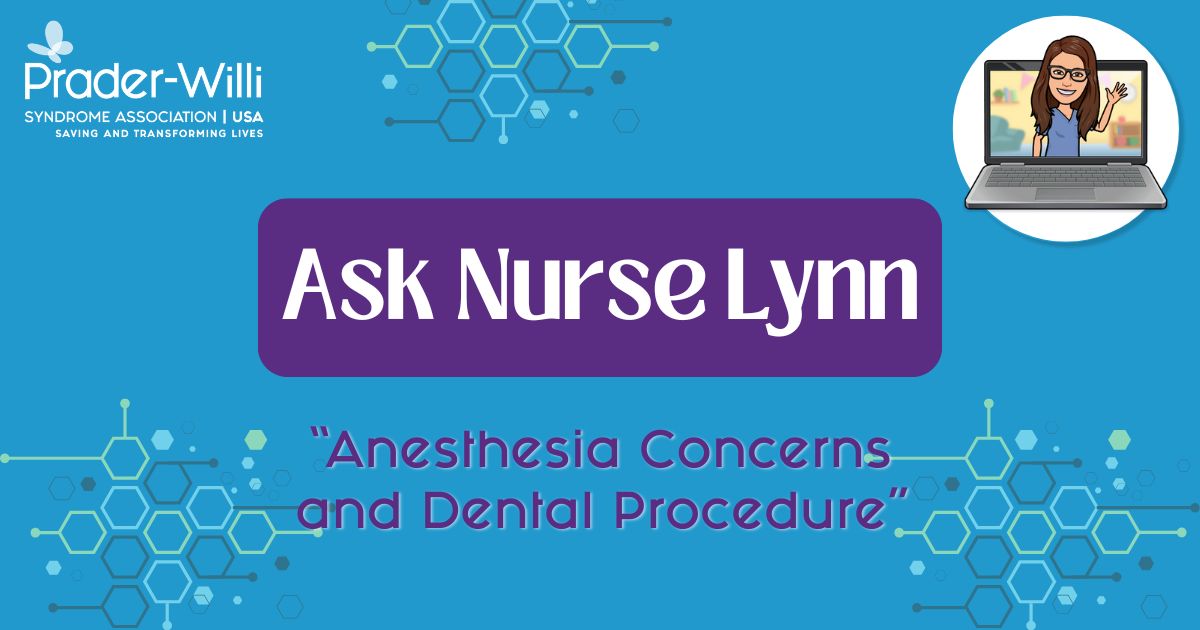Question:
Female, 38 years old, Deletion subtype
Our daughter has significant dental issues and needs to have multiple procedures. The dentist has recommended that we tackle the issues all at once in a hospital setting with anesthesia. I am immediately concerned by all the possible complications but also recognize the need to try and save some of her teeth. We were unaware of the deterioration of her dental health until we recently had her braces removed and were able to visualize the extend of the enamel erosion. Is there a consensus among the health experts as to the safest way to manage major dental procedures?
Nurse Lynn’s Response:
Many dental providers will try to get all the dental work done at one time, if possible, to reduce the trauma, number of trips and times anesthesia is used. There are several things to consider prior to surgery, some of which I have listed below. I will also link the anesthesia handout from our website which you can give to the medical/dental team.
- Obesity and Airway Obstruction
Some individuals with PWS have significant obesity, which can increase the risk of airway obstruction, especially under general anesthesia. Obesity can lead to challenges with intubation or maintaining a clear airway, so care must be taken to ensure appropriate airway management. An anesthesiologist may need to assess the patient’s airway thoroughly before administering anesthesia and have plans in place for secure airway management, including the use of special equipment or techniques if necessary. - Hypotonia (Low Muscle Tone)
Hypotonia is a common feature of PWS, and it can affect the respiratory muscles, including those that control the airway. This can increase the risk of respiratory issues, especially during sedation or general anesthesia. Close monitoring of respiratory function is critical. Additionally, anesthesia providers may adjust drug dosages based on muscle tone and respiratory considerations. - Sensitivity to Medications
Individuals with PWS may have altered responses to medications, including anesthetic agents. They might require lower doses of certain anesthetics or sedatives due to slower drug metabolism or altered pharmacodynamics. A careful assessment of drug history and individualized anesthetic planning is necessary to avoid over-sedation or under-sedation. Medications like opioids should be used cautiously, as individuals with PWS can be more sensitive to them. - Endocrine Issues (Growth Hormone Deficiency)
Many individuals with PWS have growth hormone deficiency, which can affect their metabolism, muscle mass, and overall physiological response to anesthesia. An endocrinologist may be consulted to help manage any potential metabolic concerns and optimize the patient’s condition before anesthesia. - Gastroesophageal Reflux Disease (GERD)
GERD is common in PWS and can increase the risk of aspiration during anesthesia. Preventative measures, such as using a prophylactic antiemetic or elevating the head during and after sedation,can help reduce the risk of aspiration. - Temperature Regulation Issues
People with PWS often have difficulty regulating their body temperature, which can become problematic during anesthesia. It is helpful to inform the team of your child’s “normal” temperature. Careful monitoring of body temperature before, during, and after the procedure is crucial to avoid hypothermia or hyperthermia. - Psychiatric and Behavioral Concerns
Individuals with PWS may have psychiatric conditions like anxiety or obsessive behaviors, which can complicate the preoperative and postoperative experience. These conditions may also affect their ability to communicate discomfort or issues after the procedure. Many individuals with PWS pick at their skin. Postoperatively, this should be closely monitored to prevent infection or injury to the surgical site(s).
Postoperatively, besides monitoring for infection and following the discharge orders, careful monitoring of bowel function should occur. After surgery, many people are not as active as they usually are and are on some type of pain medications which increases the risk of constipation.
Resource:
Anesthesia-and-PWS-Loker-2022-1.pdf
Do you have a question for Nurse Lynn? Submit your question here:
Share this!





 Jennifer Bolander has been serving as a Special Education Specialist for PWSA (USA) since October of 2015. She is a graduate of John Carroll University and lives in Ohio with her husband Brad and daughters Kate (17), and Sophia (13) who was born with PWS.
Jennifer Bolander has been serving as a Special Education Specialist for PWSA (USA) since October of 2015. She is a graduate of John Carroll University and lives in Ohio with her husband Brad and daughters Kate (17), and Sophia (13) who was born with PWS. Perry A. Zirkel has written more than 1,500 publications on various aspects of school law, with an emphasis on legal issues in special education. He writes a regular column for NAESP’s Principal magazine and NASP’s Communiqué newsletter, and he did so previously for Phi Delta Kappan and Teaching Exceptional Children.
Perry A. Zirkel has written more than 1,500 publications on various aspects of school law, with an emphasis on legal issues in special education. He writes a regular column for NAESP’s Principal magazine and NASP’s Communiqué newsletter, and he did so previously for Phi Delta Kappan and Teaching Exceptional Children. Evan has worked with the Prader-Willi Syndrome Association (USA) since 2007 primarily as a Crisis Intervention and Family Support Counselor. Evans works with parents and schools to foster strong collaborative relationships and appropriate educational environments for students with PWS.
Evan has worked with the Prader-Willi Syndrome Association (USA) since 2007 primarily as a Crisis Intervention and Family Support Counselor. Evans works with parents and schools to foster strong collaborative relationships and appropriate educational environments for students with PWS. Dr. Amy McTighe is the PWS Program Manager and Inpatient Teacher at the Center for Prader-Willi Syndrome at the Children’s Institute of Pittsburgh. She graduated from Duquesne University receiving her Bachelor’s and Master’s degree in Education with a focus on elementary education, special education, and language arts.
Dr. Amy McTighe is the PWS Program Manager and Inpatient Teacher at the Center for Prader-Willi Syndrome at the Children’s Institute of Pittsburgh. She graduated from Duquesne University receiving her Bachelor’s and Master’s degree in Education with a focus on elementary education, special education, and language arts. Staci Zimmerman works for Prader-Willi Syndrome Association of Colorado as an Individualized Education Program (IEP) consultant. Staci collaborates with the PWS multi-disciplinary clinic at the Children’s Hospital in Denver supporting families and school districts around the United States with their child’s Individual Educational Plan.
Staci Zimmerman works for Prader-Willi Syndrome Association of Colorado as an Individualized Education Program (IEP) consultant. Staci collaborates with the PWS multi-disciplinary clinic at the Children’s Hospital in Denver supporting families and school districts around the United States with their child’s Individual Educational Plan. Founded in 2001, SDLC is a non-profit legal services organization dedicated to protecting and advancing the legal rights of people with disabilities throughout the South. It partners with the Southern Poverty Law Center, Protection and Advocacy (P&A) programs, Legal Services Corporations (LSC) and disability organizations on major, systemic disability rights issues involving the Individuals with Disabilities Education Act (IDEA), Americans with Disabilities Act (ADA), and the federal Medicaid Act. Recently in November 2014, Jim retired.
Founded in 2001, SDLC is a non-profit legal services organization dedicated to protecting and advancing the legal rights of people with disabilities throughout the South. It partners with the Southern Poverty Law Center, Protection and Advocacy (P&A) programs, Legal Services Corporations (LSC) and disability organizations on major, systemic disability rights issues involving the Individuals with Disabilities Education Act (IDEA), Americans with Disabilities Act (ADA), and the federal Medicaid Act. Recently in November 2014, Jim retired.